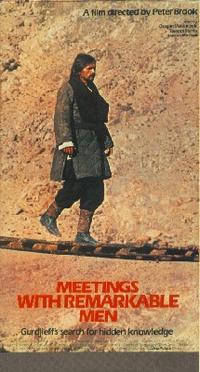
Never let the facts get in the way of a good story. I think Osho may have been telling a porky when he said that Gurdjieff was ten when his father died and gave him his deathbed advice. The Wikipedia article on Gurdjieff has this to say:
In March 1918, Ouspensky separated from Gurdjieff, and four months later Gurdjieff's eldest sister and her family reached him in Essentuki as refugees, informing him that Turks had shot his father in Alexandropol on 15 May.
Now Gurdjieff was born sometime between 1866 and 1877, nobody is really sure, and his early life is a bit of a mystery. There's very little known about him until he showed up in Moscow in 1912 and started attracting followers. One thing's for sure, he wasn't ten years old in 1918. Of course, Osho might be quoting from Gurdjieff's autobiographical "Meetings with Remarkable Men", I haven't read this yet but it is regarded as highly suspect in terms of its historical authenticy.
I was interested to learn that this book was made into a movie in 1979 and starred Terence Stamp, with somebody called Dragon Maksimovic playing the adult Gurdjieff. Suffice to say that both Osho and Gurdjieff were never averse to bending the facts to serve their purposes and that's fair enough. To quote from Brian Eno, "if you study the heuristics and logistics of the mystics, you will find that their minds rarely run in a line" or something like that. Their primary aim is to unsettle the minds of their followers, to shake them up, and playing with historical facts is a great way to do that.
The mind loves nothing more than a solid timeline to make sense of whatever the hell is going on. If we read that Gurdjieff was nine or ten when his father died and was given this deathbed advice and later he found this advice incredibly helpful, we feel that we have a bit of a handle on what the guy is all about. Of course, we haven't but we like to think that we do. Our minds try to make the mystics understandable but of course they can't be understood with the mind at all. Our mind is the biggest barrier to understanding. Well my mind is anyway, I don't know about yours.
Gurdjieff said that most people were asleep, sleepwalking through life, caught up in daydreams and mental meanderings, going nowhere as in Gary Jules' "Mad World" lyrics:
All around me are familiar faces
Worn out place, worn out faces
Bright and early for the daily races
Going nowhere, going nowhere
Their tears are filling up their glasses
No expression, no expression
Hide my head I wanna drown my sorrow
No tomorrow, no tomorrow
And I find it kind of funny, I find it kind of sad
The dreams in which I'm dying are the best I've ever had
I find it hard to tell you, I find it hard to take
When people run in circles it's a very, very
Mad world, mad world
As Ouspensky, an early follower of Gurdjieff, quotes him as saying "Man lives his life in sleep, and in sleep he dies". I'm finding it quite a struggle to wake up.
No comments:
Post a Comment